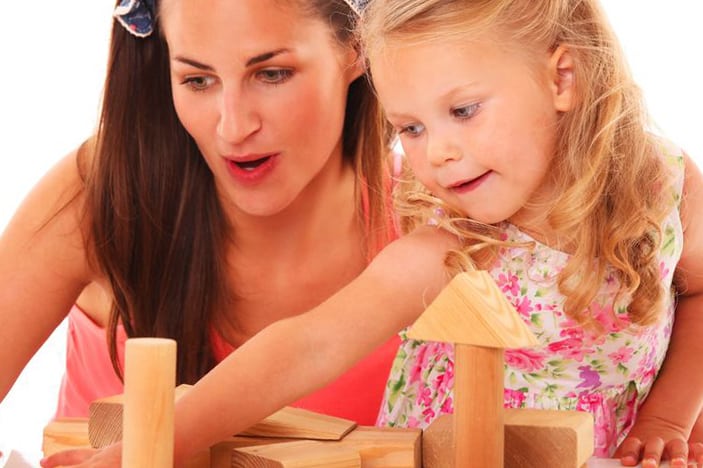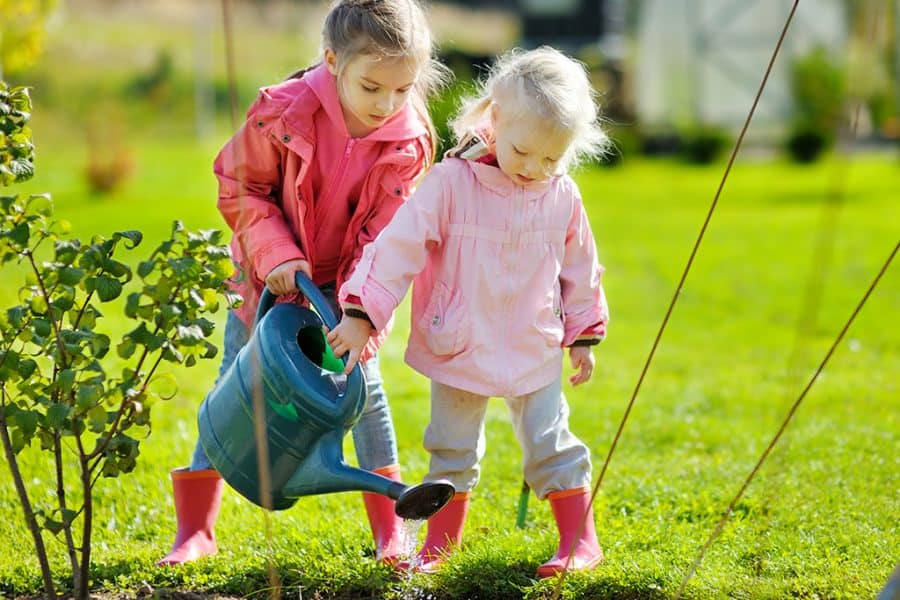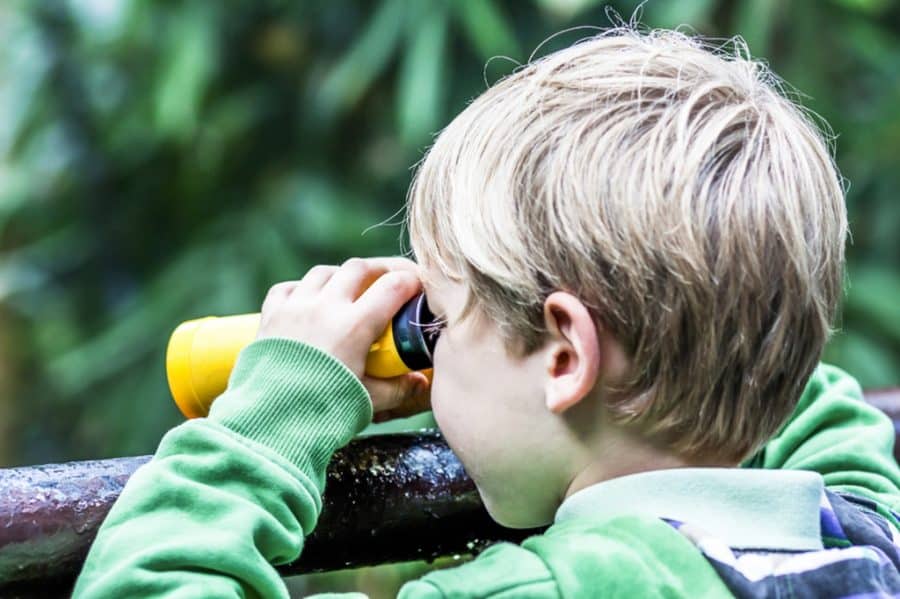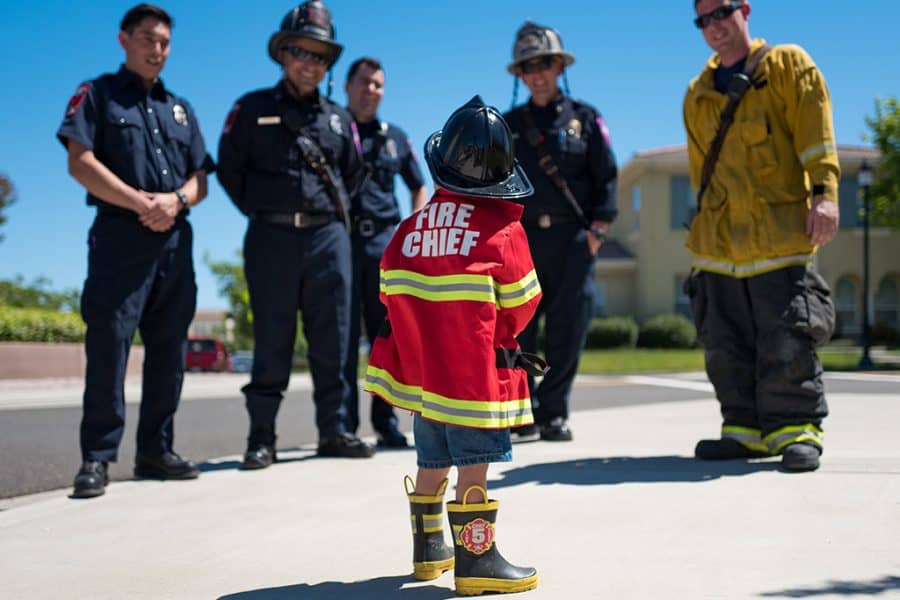Cognitive development in preschoolers focuses on information processing, such as attention, memory, decision-making, language abilities, learning, and perceptional skills. Your child’s brain is quickly developing and requires a lot of thinking and exploring.
One of the best ways to promote your preschoolers’ cognitive development is through play and cognitive activities.

Play And Cognitive Development In Early Childhood
Play is a vital component of cognitive development in early childhood and allows parents to engage with their children. By building an affectionate and loving relationship with your child, you lay the groundwork and support for their development and learning.
Through play, you can increase your preschooler’s cognitive skills and support their cognitive growth. Children learn in a hands-on, concrete manner, so lots of play and interaction are the best learning methods. Invite your child to use their imagination and creativity to solve problems.
As preschoolers play and use their imagination, they generate ideas. They use their creative skills to find different solutions for solving a problem.
The more your child plays, the more they test their limits, explore challenges, and fine-tune their decision-making skills. Through social interaction with adults and their peers, they begin developing their language skills.
Read more about Cognitive Development in Toddlers, What is Cognitive Development?, and What Are Cognitive Skills?
How To Promote Cognitive Development In Preschoolers
As we identified above, preschoolers learn best through play, particularly child-led play. However, all types of play, even adult-guided play, are beneficial.
When children play, they explore, think, create, experiment, learn how things work, and solve problems. In fact, children need lots of unstructured play that helps build confidence and resiliency.
Through experiences and interactions with others, they learn to share, cooperate, resolve conflict, negotiate, and make friends.
Use these tips to encourage Your Preschoolers’ cognitive development
- Allow for mistakes. Young children are bound to make mistakes; that is how they learn. Naturally, we want to fix things; however, it is vital to give them space to make mistakes.
- Celebrate their successes.
- Encourage decision-making by allowing your preschooler to make choices, for example, “what they want to eat,” “what to wear,” or “what they want to play.”
- Engage and spend quality time playing together.
- Help them learn about friendship, sharing, and empathy by inviting them to play with others. Try these Easy Social-Emotional Activities For Preschoolers
- Inspire them to try new things or find different solutions.
- Invite your youngster to help with simple chores. Young children this age love to imitate adults and “help.” Build their autonomy and confidence by engaging them in age-appropriate household chores.
- Younger preschoolers can help with the laundry by matching socks, sorting the clothes by type or color, and putting away their toys and blocks.
- While older preschoolers can help in the kitchen by making simple snacks, helping set the table, clearing their dishes, and watering the plants. Remember, at this age, you will need to adjust your expectations and be flexible. It is not about perfection.
- Support problem-solving by giving them the time to figure things out and not rushing in with a solution.
- Talk with your preschooler to build their language skills. Ask questions during play, like “What happens next?”
- Use your child’s interests to expand their growth and development; for example, if you see your preschooler become fascinated with whales, find additional resources, like books, crafts, games, or excursions (visit an aquarium) that support that interest.

Cognitive Development Milestones In Preschoolers
As your child moves into preschool age (3-5 years), their cognitive skills further develop. At first, their attention spans are short, and they may not complete a puzzle or sit through an entire game.
However, by the time they enter kindergarten, they should be able to finish a puzzle, play a full game, and begin learning the fine art of fair play, losing, and winning.
Whether your child attends preschool or plays at home, language skills increase, gross motor coordination improves, social skills progress, and awareness of their surroundings broadens during their preparation for kindergarten.
While they may not fully understand the difference between real and pretend, they are better equipped to observe and analyze their surroundings.
Children are like little sponges, and there is constant learning during this growth stage. They are always watching, exploring, and questioning.
Your preschooler is likely to ask many questions, especially “Why?” questions. They may begin asking sensitive questions about death, “where babies come from?” or upsetting news they see or hear.
Want to see what preschoolers’ cognitive Growth will look like over the next couple of years?
Before entering kindergarten, you can expect them to be able to:
- Balance on a beam or board.
- Be aware of gender.
- Climb a ladder.
- Comprehend the concept of time, like “past,” “present,” and “future.”
- Count 10+ things.
- Cut paper with scissors.
- Dance and sing a song.
- Do somersaults.
- Draw a 4+ body part person.
- Dress and undress themselves.
- Express what they think is going to happen next in a story.
- Hop, or they may skip.
- Kick or throw a ball.
- Know everyday items like money or food.
- Make friends.
- Name 4+ colors.
- Negotiate for things they want
- Play games like board games.
- Recall parts of a story.
- Recite their address and phone number.
- Recognize and write their own name.
- Ride a tricycle.
- Run, jump, or gallop.
- Socialize and play with others.
- Swing on the swings.
- Tell a story using their imagination.
- Walk along a circular or straight line.
- Walk down and up the stairs.
- Write or copy numbers, letters, or shapes.
Cognitive Activities For Preschoolers
As a parent, you can help increase your child’s cognitive learning by making available fun and playful cognitive activities. No structured agenda or lesson plan is required. Just plenty of time to play alone and with others, expanding their experiences.
Use These Play Ideas To Support Cognitive Development Activities:
Puzzles
Age-appropriate puzzles build preschooler’s cognitive skills, like concentration, memory, problem-solving, and critical thinking skills. Furthermore, puzzles can reinforce sorting by color, type, or shape. Choosing a puzzle, concentrating on that activity, and completing it helps support cognitive control.
Card, Matching, Or Board Games
Simple card, matching, or board games like “Old Maid,” “Go Fish,” “Matching Game,” or “Chutes & Ladders” teach kids how to follow directions, take turns, share, and problem-solve. As your preschooler masters these games, you can introduce more games with complicated strategies, like checkers. In addition, when your child encounters a problem during play, it tests their judgment, reasoning, and ability to find a solution.
Other Games For Cognitive Development
When you are out and a board or card game just won’t do, try cognitive activities like “I Spy.” What about spending the day at the park? Physical games are a wonderful way to engage. Test out games like “Hide & Seek,” “Red Light, Green Light,” or “Simon Says.” If your preschooler has mastered “Simon Says’, add a twist and have them do the opposite of what “Simon Says.”
Block Play
Preschoolers engaged in block play not only are having fun but also are exploring science and math. Children stacking or playing with wooden building blocks begin to understand wider, shorter, taller, higher, longer, heavier, and more. Explore more block play ideas with these Simple Block Activities For Toddlers And Preschoolers
Constructive Play
While it often includes blocks, constructive play is about experimenting with different materials and building approaches. Preschoolers learn to plan and assess their actions through trial and error. Trying new methods and modifying them when needed is problem-solving at its best. Find out how Creative and Constructive Play Works Best When You…
Outdoor Activities And Play
Getting outside not only helps with gross motor development but also builds cognitive skills. Nature provides an awesome science lab for preschoolers. Go on a walk, create a nature tray, or keep a nature journal. Check out these other Outside Activities For Kids.

Mazes And Obstacle Courses
You can build an obstacle course or maze from simple household items. Grab a roll of painter’s tape and create a maze on your floor (test first), patio, or driveway for your preschooler to navigate. They can maneuver their cars, balls, or bodies through the maze using their cognitive abilities. Put up an obstacle course inside or out using tables, chairs, large boxes, or giant blocks.
Singing, Rhyming, And Finger Play
Simple songs that include rhyming and actions help build cognitive skills; for example, the “ABC’s Song” helps them remember the alphabet. “I’m A Little Teapot” Or “Head And Shoulders” helps them learn to follow directions. Some songs introduce number concepts like “5 Little Ducks” or “5 Monkeys Jumping On The Bed.”
Reading
Daily reading is critical to cognitive development in preschoolers. Foster the love of books by checking out the local library or bookstore for children’s storytime.
Telling Jokes
At this age, preschoolers start to really develop a sense of humor. Find a book filled with jokes or engage them by having them tell you some jokes.
Storytelling
Encourage storytelling by alternating adding parts to a story or asking them to finish one you started. Incorporate these Simple And Powerful Language Activities For Preschoolers into your daily play.
Cooking
Invite your preschooler to help you in the kitchen. They can begin learning about healthy ingredients, measuring, and following directions. Looking at a recipe allows them to understand photo directions while building their reading and language skills. Start with simple recipes like “Ants On A Log” or “Bagel Pizzas.”
Imaginative Play Or Role Play
Many preschoolers are naturally drawn to pretend play. It is the perfect way to build their creative skills and imaginations. You are likely to find your child pretending to be something imaginary, like a pirate, superhero, or princess. However, they may also act out familiar roles like grocery shopping, cleaning the house, or being a fireman.
- Jump in and play, but let your child lead the way. Keep in mind you may need to adjust to your child’s creative process.
- Imaginative play can be as simple or elaborate as you care to make it. Add basic dress-up props, like old hats, purses, or shoes, from time to time. Need a crown, sword, or magic wand? Get the kids involved and try some crafts projects using paper towel rolls or construction paper.
- Build a fort from jumbo blocks or put a blanket over a table and chairs.
- Preschooler running out of ideas? Feel free to prompt a new pretend play scenario. It might be based on real-life activities like shopping or caring for a baby, animal, or someone sick. Maybe it involves acting out a fairy tale, good versus evil, or some other silly idea. Learn more about the Benefits Of Imaginative Play & Why It’s So Important.

Everyday experiences like talking, reading, or playing a game have the power to boost your preschoolers’ cognitive development, growth, and cognitive skills. So, no matter how you engage with your preschooler, whether through outdoor activities, unstructured free play, or cognitive activities like block play, let them be the leader. What cognitive activities for preschoolers will you try today?
